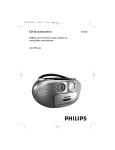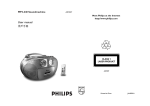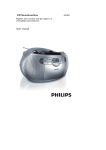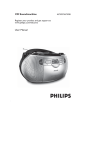Download Philips AZ1142 Operating Instructions Manual
Transcript
AZ AZ AZ AZ CD Radio Cassette Recorder CD TUNER BATT BATT LOW LOW TAPE OFF VOL DBB DYNAMIC BASS BOOST PAUSE BA PR STOP•O PEN SEAR CH 1 PLAY PLAY•PA USE RECO RD CD PROGRAM REPEAT ALL CD MO DE SEA RC H STOP PRO GRA M AZ1 140 CD RA DIO CASS ETTE RECO RDER DY NA M IC BAS S B OO ST Downloaded From Disc-Player.com Philips Manuals 2 3 ES ET ND 1140 1141 1142 1143 * 1 2 34 5 6 5 7 8 9 CD TUNER BATT LOW TAPE OFF VOL DBB DYNAMIC BASS BOOST BA PAUSE PR STOP•O PEN SEAR CH 1 2 ES ND ET 3 PLAY PLAY•PA USE RECO RD CD PROGRAM REPEAT ALL CD MO DE SEA RC H STOP PRO GRA M & CD RA DY NA 0! @# AZ1 DIO CASS M IC 140 ETTE RECO BAS $ RDER S B OO ST % ^ * ( ) ¡ Downloaded From Disc-Player.com Philips Manuals 3 CONTROLS English TOP AND FRONT PANELS 1 POWER slider - selects the sound source for CD/ TUNER/ TAPE OFF and also switches the set off 2 VOL - adjusts the volume level 3 BATT LOW - indicates when battery power is running low 4 DBB (Dynamic Bass Boost) - enhances the bass 5 OPEN•CLOSE - opens/ closes the CD door 6 CASSETTE RECORDER keys RECORD 0 - starts recording PLAY 1 - starts playback SEARCH 5/ 6 - fast winds/rewinds the tape STOP•OPEN 9/ - stops the tape; - opens the cassette compartment PAUSE ; - interrupts recording or playback 7 1-3 - programmes and selects your favourite three radio stations 8 PRESET 3, 4 - (up, down) selects preset tuner stations 9 BAND - selects waveband 0 PLAY PAUSE 2; - starts /pauses CD playback ! CD MODE - selects a different play mode e.g. SHUFFLE/ REPEAT CD tracks or programme in random /repeated order @ STOP 9 - stops CD playback or erase a CD programme; activates/ deactivates display demo mode. # Cassette door $ Display - shows the status of the set % SEARCH ∞/ § Tuner: (down, up) tunes radio stations. CD: - searches back and forward within a track; - skips to the beginning of a current track/ previous/ later track ^ PROGRAM Tuner - programmes preset radio stations; CD - programmes tracks and reviews the programme BACK PANEL & p - 3.5 mm stereo headphone jack * Telescopic antenna - improves FM reception ( BEAT CUT switch - eliminates possible whistle tones during MW/LW recordings ) AC MAINS - inlet for power cord ¡ Battery compartment - for six batteries, type R-14, UM-2 or C-cells CAUTION Use of controls or adjustments or performance of procedures other than herein may result in hazardous radiation exposure or other unsafe operation. Environmental information All unnecessary packaging material has been omitted. We have done our utmost to make the packaging easy to separate into three mono-materials: cardboard (box), expandable polystyrene (buffer), polyethylene (bags, protective foam). Your set consists of materials which can be recycled if disassembled by a specialized company. Please observe the local regulations regarding the disposal of packing materials, exhausted batteries and old equipment. Downloaded From Disc-Player.com Philips Manuals 4 POWER SUPPLY English Whenever convenient, use the mains supply if you want to conserve battery life. Make sure you remove the plug from the set and wall socket before inserting batteries. BATTERIES (OPTIONAL) 1. Open the battery compartment and insert six batteries, type R-14, UM-2 or C-cells, (preferably alkaline) with the correct polarity as indicated by the "+" and "-" symbols inside the compartment. 6 x R14 • UM-2 • C-CELLS 2. Replace the compartment door, making sure the batteries are firmly and correctly in place. The set is now ready to operate. – If BATT LOW lights up, battery power is running low. – The BATT LOW indicator eventually goes out if the batteries are too weak. Incorrect use of batteries can cause electrolyte leakage and will corrode the compartment or cause the batteries to burst. Therefore: • Do not mix battery types: e.g. alkaline with carbon zinc. Only use batteries of the same type for the set. • When inserting new batteries, do not try to mix old batteries with the new ones. • Remove the batteries if the set is not to be used for a long time. • Batteries contain chemical substances, so they should be disposed of properly. For users in the U.K.: please follow the instructions on page 2. Using AC MAINS 1. Check if the mains voltage as shown on the type plate on the base of the set, corresponds to your local mains supply. If it does not, consult your dealer or service centre. 2. If your set is equipped with a voltage selector, adjust the selector so that it matches with the local mains supply. 3. Connect the mains lead to the wall socket and the set is now ready for use. 4. To disconnect the set from the mains supply completely, remove the plug from the wall socket. Downloaded From Disc-Player.com Philips Manuals 5 BASIC FUNCTIONS GENERAL INFORMATION English Switching on and off • Adjust the POWER slider to the desired sound source: CD, TUNER or TAPE/OFF. • The set is switched off when the POWER slider is in the TAPE/OFF position and the keys on the tape deck are released. ™ The volume and tuner presets will be retained in the set's memory. Adjusting volume and sound 1. Turn the VOL control to increase or decrease VOLUME. 2. Adjust the DBB control to select dynamic bass boost on or off. CD TUNER BATT LOW TAPE OFF VOL DBB DYNAMIC BASS BOOST PAUS E STOP •OPE N SEAR CH PLAY PLAY•PA USE RECO RD CD PROGRAM REPEAT ALL CD TUNER BATT LOW TAPE OFF VOL DBB DYNAMIC BASS BOOST PAUS E STOP •OPE N SEAR CH PLAY PLAY•PA USE RECO RD CD PROGRAM REPEAT ALL PHILIPS demo mode 1. On the set, press the CD STOP 9 button for 5 seconds. ™ PH..IL ..IPS scrolls across the display continuously. 2. To return to the current display you can either: • press any function button on the front panel. This interrupts the demo mode for 30 seconds; • press the CD STOP 9 button for 5 seconds. PH..IL ..IPS scrolls once before the demo mode is cancelled. GENERAL INFORMATION General maintenance • Do not expose the set, batteries, CDs or cassettes to humidity, rain, sand or excessive heat caused by heating equipment or direct sunlight. • To clean the set, use a soft, slightly dampened chamois leather. Do not use any cleaning agents containing alcohol, ammonia, benzene or abrasives as these may harm the housing. Safety information • Place the set on a hard and flat surface so that the system does not tilt. Make sure there is adequate ventilation to prevent the system from overheating. • The mechanical parts of the set contain self-lubricating bearings and must not be oiled or lubricated. Downloaded From Disc-Player.com Philips Manuals 6 DYNAMIC BASS BOOST PAUS E STOP •OPE N SEAR CH PLAY PLAY•PA USE RECO RD CD PROGRAM REPEAT ALL CD MO DE SEAR CH STOP PROG RAM DIGITAL TUNER BA STOP PR •OPE N SEAR CH 1 2 2 3 ES English TUNING TO RADIO STATIONS 1. Select TUNER source. ™ is displayed briefly and then the radio station frequency is shown. 2. Press BAND once or more to select your waveband. 3. Press SEARCH ∞ or § and release when the frequency in the display starts running. ™ The tuner automatically tunes to a station of sufficient reception. Display shows during automatic tuning. ™ If a FM station is received in stereo, STEREO is shown. 4. Repeat step 3 if necessary until you find the desired station. • To tune to a weak station, press SEARCH ∞ or § briefly and repeatedly until you have found optimal reception. 5. Adjust the power slider to TAPE/OFF position to switch off the set. ND ET 3 PLAY RECO RD CD PROGRAM REPEAT ALL SEAR CH PROG RAM To improve radio reception – For FM, pull out the telescopic aerial. Incline and turn the aerial. Reduce its length if the signal is too strong (very close to a transmitter). – For MW/LW, the set is provided with a built-in aerial so the telescopic aerial is not needed. Direct the aerial by turning the whole set. Favourite station selection For your favourite 3 tuner stations, you can use the easy one-touch programming and selection 1, 2 or 3 buttons. 1. Tune to your desired station (see Tuning to radio stations). 2. To store your station, press 1, 2 or 3 for 2 seconds or more. ™ Display: shows PROGRAM briefly, your favorite preset station number and the tuner frequency. Programming radio stations You can store up to a total of 30 radio stations in the memory. 1. Tune to your desired station (see Tuning to radio stations). 2. Press PROGRAM to activate programming. – Display: PROGRAM flashes. 3. Press PRESET 4 or 3 once or more to allocate a number from 1 to 30 to this station. 4. Press PROGRAM again to confirm the setting. – Display: PROGRAM disappears, the preset number and the frequency of the preset station are shown. 5. Repeat the above four steps to store other stations. – You can overwrite a preset station by storing another frequency in its place. BA PR PEN SEAR 1 CH ES ND ET PLAY RECO RD CD GRAM PEAT ALL SEAR CH PROG RAM BA PR SEAR 1 CH 2 ES ND ET 3 PLAY RECO RD D M T SEAR CH PROG RAM Tuning to preset stations Press 1, 2, 3 or PRESET 4 or 3 until the desired preset station is displayed. Downloaded From Disc-Player.com Philips Manuals 7 CD PLAYER English Playing a CD 1. Select CD source. ™ is displayed briefly. 2. Lift the CD door open. ™ Display: when you open the CD door. 3. Insert a CD or CD-R(W) with the printed side facing up and close the CD door. ™ Display: d1SC flashes as the CD player scans the contents of a CD. The total number of tracks and playing time are then shown. Display: is shown if the CD-R(W) is blank or not finalised. 4. Press PLAY•PAUSE 2; to start playback. ™ Display: Current track number and elapsed playing time of the track during CD playback. 5. To pause playback press PLAY•PAUSE 2;. Press PLAY•PAUSE 2; again to resume play. ™ The display freezes and the elapsed playing time flashes when playback is paused. 6. To stop CD playback, press STOP 9. CD TUNER BATT LOW TAPE OFF VOL DBB DYNAMIC BASS BOOST PAUS E STOP •OPE N SEAR 1 CH PLAY PLAY•PA USE RECO RD CD PROGRAM REPEAT ALL DYNAMIC BASS BOOST PAUS E STOP •OPE N SEAR 2 1 CH PLAY PLAY•PA USE RECO RD CD PROGRAM REPEAT ALL CD MO DE SEAR CH STOP PROG RAM Note: CD play will also stop when: – the CD door is opened; – the CD has reached the end (unless you have selected REPEAT or REPEAT ALL); – you select another source: TAPE / TUNER. Selecting a different track • Press SEARCH ∞ or § once or repeatedly until the desired track number appears in the display. • If you have selected a track number shortly after loading a CD or in the PAUSE position, you will need to press PLAY•PAUSE 2; to start playback. Finding a passage within a track 1. Press and hold down on SEARCH ∞ or §. ™ The CD is played at high speed and low volume. 2. When you recognize the passage you want, release SEARCH ∞ or §. – Normal playback continues. PAUS E STOP Downloaded From Disc-Player.com Philips Manuals 8 N SEAR 1 CH PLAY RECO RD CD PROGRAM REPEAT ALL CD MO DE SEAR CH STOP PROG RAM PLAY PLAY•PA USE RECO RD CD PROGRAM REPEAT ALL CD MO DE SEAR CH STOP PROG RAM CD RA Note: During a CD programme or if SHUFFLE/ REPEAT active, searching is only possible within a track. •OPE PLAY•PA USE AZ 11 40 CD PLAYER English Different play modes: SHUFFLE and REPEAT You can select and change the various play modes before or during playback. The play modes can also be combined with PROGRAM. SHUFFLE - tracks of the entire CD/ programme are played in random order SHUFFLE and REPEAT ALL - to repeat the entire CD/ programme continuously in random order REPEAT ALL - to repeat the entire CD/ programme REPEAT - to play the current track continuously 1. To select your play mode, press the CD MODE key before or during playback until the display shows the desired function. 2. Press PLAY•PAUSE 2; to start playback if in the STOP position. 3. To return to normal playback, press the CD MODE key until the various SHUFFLE / REPEAT modes are no longer displayed. – You can also press STOP 9 to cancel your play mode. DYNAMIC BASS BOOST PAUS E STOP •OPE N SEAR CH PLAY PLAY•PA USE RECO RD CD PROGRAM REPEAT ALL CD MO DE SEAR CH STOP PROG RAM Programming track numbers Programme in the STOP position to select and store your CD tracks in the desired sequence. If you like, store any track more than once. Up to 20 tracks can be stored in the memory. 1. Use the SEARCH ∞ or § on the set, to select your desired track number. 2. Press PROGRAM. ™ Display: PROGRAM and the selected track number. appears briefly. ™ If you attempt to programme without first selecting a track number, is shown. 3. Repeat steps 1-2 to select and store all desired tracks. ™ is displayed if you attempt to programme more than 20 tracks. 4. To start playback of your CD programme, press PLAY•PAUSE 2;. STOP •OPE N SEAR CH PLAY PLAY•PA USE RECO RD CD PROGRAM REPEAT ALL CD MO DE SEAR CH STOP PROG RAM CD PROGRAM Reviewing the programme In the STOP position, press and hold down PROGRAM for a while until the display shows all your stored track numbers in sequence. Downloaded From Disc-Player.com Philips Manuals 9 CD PLAYER CASSETTE RECORDER English Erasing a programme You can erase the programme by: – pressing STOP 9 once in the STOP position or twice during playback. The display shows ' ' briefly. – pressing the CD door open; – switching to TUNER/TAPE source. DYNAMIC BASS BOOST PAUS E STOP •OPE N SEAR 1 CH PLAY PLAY•PA USE RECO RD CD PROGRAM REPEAT ALL CD MO DE SEAR CH STOP PROG RAM CD player and CD handling • If the CD player cannot read CDs correctly, use a commonly available cleaning CD to clean the lens before taking the set to repair. Other cleaning methods may destroy the lens. • The lens of the CD player should never be touched! • Sudden changes in the surrounding temperature can cause condensation to cloud over on the lens of your CD player. Playing a CD is then not possible. Do not attempt to clean the lens but leave the set in a warm environment until the moisture evaporates. • Always keep the CD compartment closed to avoid dust on the lens. • To take a CD out of its box, press the centre spindle while lifting the CD. Always pick up the CD by the edge and return the CD to its box after use to avoid scratching and dust. • To clean the CD, wipe in a straight line from the centre towards the edge using a soft, lint-free cloth. Do not use cleaning agents as they may damage the disc. • Never write on a CD or attach any stickers to it. X PLAYING A CASSETTE 1. Select TAPE source. ™ The display shows tAPE throughout tape operation. 2. Press STOP•OPEN 9/ to open the cassette door. 3. Insert a recorded cassette and close the cassette door. 4. Press PLAY 1 to start playback. 5. To interrupt playback, press PAUSE ;. To resume, press the key again. 6. By pressing SEARCH 5 or 6 on the set,fast winding of the tape is possible in both directions. 7. To stop the tape, press STOP•OPEN 9/. – The keys are automatically released at the end of the tape and the tAPE indication goes out, except if PAUSE ; has been activated. Downloaded From Disc-Player.com Philips Manuals 10 CD TUNER BATT LOW TAPE OFF VOL DBB DYNAMIC BASS BOOST PAUS E STOP •OPE N SEAR 1 CH PLAY PLAY•PA USE RECO CD PROGRAM REPEAT ALL RD RECORDING English GENERAL INFORMATION ON RECORDING • Recording is permissible insofar as copyright or other rights of third parties are not infringed. • This deck is not suitable for recording on CHROME (IEC II) or METAL (IEC IV) type cassettes. For recording, use NORMAL type cassettes (IEC I) on which the tabs have not been broken. • The best recording level is set automatically. Altering the VOL and DBB controls will not affect the recording in progress. • At the very beginning and end of the tape, no recording will take place during the 7 seconds, when the leader tape passes the recorder heads. • To protect a tape from accidental erasure, have the tape in front of you and break out the left tab. Recording on this side is no longer possible. To record over this side again, cover the tabs with a piece of adhesive tape. SYNCHRO START CD RECORDING 1. Select CD source. 2. Insert a CD and if desired, programme track numbers. 3. Press STOP•OPEN 9/ to open the cassette door. 4. Insert a suitable cassette into the cassette deck and close the cassette door. 5. Press RECORD 0 to start recording. – Playing of the CD programme starts automatically from the beginning of the programme. It is not necessary to start the CD player separately. To select and record a particular passage within a track • Press and hold down on SEARCH ∞ or §. • When you recognize the passage you want, release SEARCH ∞ or §. • To pause CD playback press PLAY/PAUSE 2;. • Recording will begin from this exact point in the track when you press RECORD 0. 6. For brief interruptions during recording press PAUSE ;. To resume recording, press PAUSE ; again. 7. To stop recording, press STOP•OPEN 9/. Downloaded From Disc-Player.com Philips Manuals CD TUNER BATT LOW TAPE OFF VOL DBB DYNAMIC BASS BOOST PAUS E STOP •OPE N SEAR 1 CH 2 PLAY PLAY•PA USE RECO RD CD PROGRAM REPEAT ALL CD MO DE SEAR CH STOP DYNAMIC BASS BOOST PAUS E STOP •OPE N SEAR CH PLAY PLAY•PA USE RECO RD CD PROGRAM REPEAT ALL CD MO DE SEAR CH STOP PROG RAM 11 RECORDING English Recording from the radio 1. Tune to the desired radio station (See TUNING TO RADIO STATIONS). 2. Press STOP•OPEN 9/ to open the cassette door. 3. Insert a suitable cassette into the cassette deck and close the cassette door. 4. Press RECORD 0 to start recording. • If you are recording from MW/LW stations, adjust the BEAT CUT switch to eliminate possible whistle tones during recording. 5. For brief interruptions, press PAUSE ;. To resume recording, press PAUSE ; again. 6. To stop recording, press STOP•OPEN 9/. MAINTENANCE CD TUNER BATT LOW TAPE OFF VOL DBB DYNAMIC BASS BOOST PAUS E STOP •OPE N SEAR 1 CH PLAY PLAY•PA USE RECO CD PROGRAM REPEAT ALL CD MO DE MAINTENANCE Tape deck maintenance To ensure quality recording and playback of the tape deck, clean parts A,B and C shown in the diagram below, after approx. 50 hours of operation, or on average once a month. Use a cotton bud slightly moistened with alcohol or a special head cleaning fluid to clean the deck. 1. Open the cassette door by pressing STOP•OPEN 9/. 2. Press PLAY 1 and clean the rubber pressure rollers C. 3. Press PAUSE ; and clean the magnetic heads A and also the capstan B . 4. After cleaning, press STOP•OPEN 9/. Note: Cleaning of the heads can also be done by playing a cleaning cassette through once. Downloaded From Disc-Player.com Philips Manuals 12 C B A A RD If a fault occurs, first check the points listed below before taking the set for repair. If you are unable to remedy a problem by following these hints, consult your dealer or service centre. WARNING: Do not open the set as there is a risk of electric shock. Under no circumstances should you try to repair the set yourself, as this would invalidate the guarantee. PROBLEM – POSSIBLE CAUSE • REMEDY No sound/power – VOLUME not adjusted • Adjust the VOLUME – Headphones connected • Disconnect headphones – Mains lead not securely connected • Connect the mains lead properly Severe radio hum or noise – Electrical interference: set too close to TV, VCR or computer • Increase the distance Poor radio reception – Weak radio signal • FM: Direct the FM telescopic aerial for optimum reception • MW/LW: Turn the set for optimum reception or indication No CD inserted Insert a CD CD badly scratched or dirty Replace/ clean CD, see CD player and CD handling – Laser lens steamed up, • Wait until lens has cleared – • – • – • – • indication CD-R(W) is blank or the disc is not finalised Use a finalised CD-R(W) CD badly scratched or dirty Replace/ clean CD, see CD player and CD handling The CD skips tracks – CD is damaged or dirty • Replace or clean the CD – SHUFFLE or a programme is active • Switch off SHUFFLE/PROGRAM Poor cassette sound quality – Dust and dirt on the heads, etc. • Clean deck parts etc., see Maintenance – Use of incompatible cassette types (METAL or CHROME) • Only use NORMAL (IEC I) for recording Recording does not work – Cassette tab(s) may be broken • Apply a piece of adhesive tape over the missing tab space This product complies with the radio interference requirements of the European Union. The type plate is located on the bottom of the set. Downloaded From Disc-Player.com Philips Manuals 13 English TROUBLESHOOTING




















